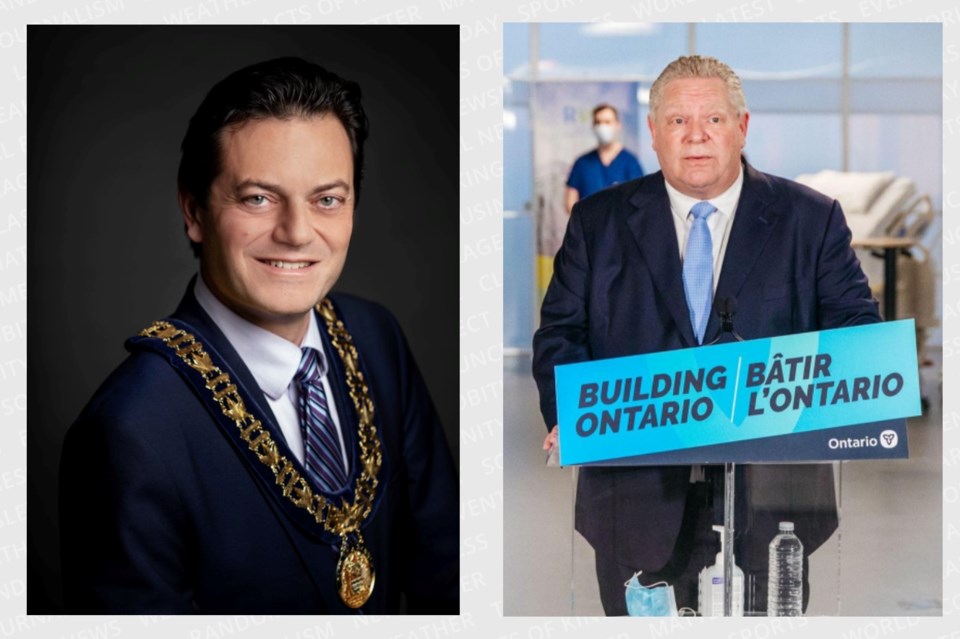The gavel may one day be heavier, and louder, for Ontario mayors.
Premier Doug Ford’s recent announcement about a ’strong mayor’ system in Toronto and Ottawa could foreshadow the same fate for other local governments. It could give mayors veto powers over city council decisions, although a two-thirds majority of council could override the mayor’s veto.
Barrie Mayor Jeff Lehman, who is not running for re-election after almost 12 years in the big chair, said he’s of two minds about a ’strong mayor’ system.
“In general, when I look back, there were relatively few important votes of council that I would have overturned if I had a veto,” he told BarrieToday. “I have always tried to build a working consensus on council and that has worked well in advancing my agenda for Barrie.”
Lehman cited that all 12 of the budgets during his time as mayor were passed with strong support from council, almost all unanimously.
And the three task forces that reported to council earlier this year — housing affordability, market precinct and performing arts centre — also had unanimous support, despite being issues where councillors had widely ranging views, he said.
“Moving forward an agenda by building consensus is the key skill a mayor must have,” Lehman said. “Where councils are so broken that consensus is impossible, I can certainly see an argument for a veto. And on some other issues, it would certainly speed things up to give mayors more authority.”
Mayors have one vote on municipal councils, just like its other members.
And there are other arguments for a ’strong mayor’ system.
“I understand the thinking for larger cities where city councils have become permanently or consistently partisan, or where the group decision-making has bogged down and that's slowing down something critically important,” Lehman said. “Mayors are elected by city residents to further the interests of everyone collectively and so, at our best, we can act to overcome parochialism or dysfunction, and move faster.”
In essence, Lehman said, this is how Barrie operated during the state of emergency brought on by the pandemic. In several instances, he moved forward with actions as mayor to respond to something faster than council could.
“There were states of emergency in place in virtually all Ontario cities over the past two years and I think it allowed many cities to respond faster to pandemic issues than they otherwise could,” he said. “I didn't hear of many problems where mayors abused this power.”
Lehman said he thinks where the province seems to be going with a ‘strong mayor’ system is some expectation that mayors would veto decisions by council to turn down housing applications, because of NIMBYism, or not in my back yard.
He’s not sure it works that way, however.
“The mayor has a mandate from all the people of the city and is less likely to put NIMBY concerns above the needs of the greater good,” Lehman said. “While this could be helpful when council blatantly caves to NIMBY, contrary to policy, the opposite could be true, where the mayor approves a project that is contrary to policy.
“And how would this work if the residents then appealed the mayor's decision to LPAT (Local Planning Appeal Tribunal, now the Ontario Land Tribunal)? Would the mayor testify on one side, and council on the other? Highly problematic," he added.
And there could be other snags in this system, too.
“What about a situation where the mayor doesn't show good judgment or misuses this power?” Lehman said. “It would be very problematic for one person to have unchecked power. We can all think of mayors where there would be real concern with unchecked authority.”
Lehman, who ran for the Liberals in the Barrie-Springwater-Oro-Medonte riding in the June 2 Ontario election, noted Progressive Conservative Premier Ford did not talk about a ‘strong mayor’ system during the provincial campaign.
“He does not have any kind of mandate for this change,” Lehman said. “If he wants to move forward, therefore, it should only be in partnership with AMO (the Association of Municipalities of Ontario), OBCM (Ontario’s Big City Mayors), and the sector, not rushed at the last minute before a municipal election with the housing crisis as an excuse. They need to do some work here if they want to proceed.”
Lehman also noted there are few details about this proposal, making it difficult to know if it's workable.
“Done right, this could help move some things faster and overcome some problems like NIMBY,” he said. “I can think of ways it would help. But done wrong, it could do a lot more damage.”
Ford has said he intends to move ahead with introducing a ‘strong mayor’ system in Toronto and Ottawa immediately, before the upcoming municipal elections in October.
This is not the first time Ford has meddled in municipal politics. In 2018, the province reduced Toronto council to 25 members from 47 just before the city election that year.
Barrie’s next mayor will be elected Oct. 24. The candidates so far are Rob Haverson, Gerry Marshall, Mike McCann, Alex Nuttall, and Barry Ward. Nominations close Aug. 19.
— With files from The Canadian Press
